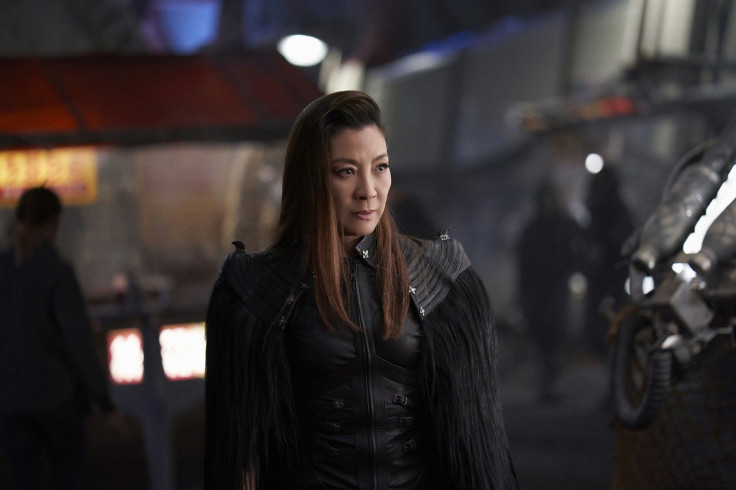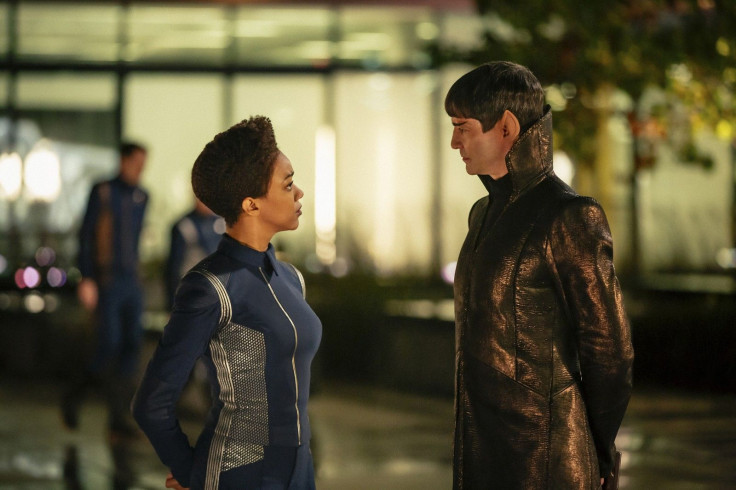The final episode of Star Trek: Discovery’s first season, “Will You Take My Hand?,” achieves what no other episode of the new series does by effectively emulating a mediocre installment of Star Trek: The Next Generation.
Two previous episodes have positioned themselves as narrative closers. In the ninth episode, “Into The Forest I Go,” the USS Discovery NCC-1031 mastered the spore drive, destroyed the Klingon Ship of the Dead and cracked the Klingons’ cloaking technology, effectively ending the Klingon War (or so we thought). Four episodes later, in “What’s Past Is Prologue,” Discovery killed Lorca, decapitated the Terran Empire and returned to the Prime Universe, closing a four-episode arc in the Mirror Universe. In each instance, a major serial story reached semi-conclusion with as much action, explosions, running around, phaser fire and blood as the Discovery budget could manage, both episodes acting like the kind of demi-climax we’ve come to expect from the type of prestige TV, Game of Thrones primarily, that Star Trek: Discovery so clearly wants to be.
“Will You Take My Hand?” is substantially different in tone. Having proved they could do the whole fleet vs. fleet thing, the Star Trek: Discovery finale admirably asserts the core premises of Star Trek and its “peacekeeping and humanitarian armada” (hate 2009’s Star Trek all you want, but Pike’s description remains apt as hell). Starfleet is better at peace than war. Rather than bashing all its carefully placed toys against each other, Discovery brought it all to a conclusion dependent on the extension of humanism to other races, the upholding of principle over wartime expediency and the ever-present possibility of diplomacy. But the contortions necessary to arrive here bent the whole episode out of shape.
In the penultimate episode, “The War Without, The War Within,” Admiral Cornwell hands control of the Discovery over to the Terran Emperor Georgiou and tacitly endorses a victory-at-any-cost strike against the Klingon homeworld Qo’noS. The Discovery crew goes along with this plan, with Burnham and Saru even allowing Emperor Georgiou to pass herself off as her long-dead counterpart. Soon after beaming down to an Orion diplomatic outpost (even Discovery ’s progressive high-mindedness can’t resist green sex slaves), Tilly uncovers Georgiou’s real plan: genocide. Rather than sending a mapping drone into the hollow caverns beneath Qo’noS, Georgiou has sent a world-destroying nuke.
And so finally Star Trek: Discovery arrives at the moment the whole season is engineered around: the assertion of Starfleet values. After a season of always sliding further into barbarism, where one entire episode revolved around the apparently difficult moral choice over whether or not to steer your spaceship by torturing an alien, the most generous thing to say for this clarifying, final declaration of Starfleet’s values is “better late than never.” If a society has to arrive at genocide before drawing a line in the sand, maybe its purported values weren’t all that closely held in the first place.
Still, you can see what Discovery was going for, right down to the carefully crafted parallel between Burnham’s first mutiny — performed unilaterally — and her second, in which she stands up to Admiral Cornwell with the full backing of the Discovery crew. Star Trek utopian values aren’t a fixed state, Discovery tells us. Instead, a better future must be won again and again by people brave enough to insist that society live up to its higher aspirations, rather than treating them like inconveniences when the going gets tough. It’s a classic Star Trek plot that’s animated classics like TNG Season 4 episode “The Drumhead.” But by spreading it over an entire season of television, Discovery created a scenario in which Starfleet is failing itself again and again, essentially until Hour 15.
It doesn’t help that the grand resolution to this season-long lesson comes down to a doomsday device. After thwarting Georgiou’s plan, the Discovery crew re-syncs the bomb to L’Rell’s vitals and hands her a button, with which she ends the war, rules over the Klingons and reunites the warring houses. This isn’t diplomacy, it’s Rube Goldberg with a nuke. Despite all the nice speeches, Star Trek: Discovery never really found a way to bridge the Federation and the Klingons, so instead they fell back on a literal plot-ending widget. What a baffling and perfunctory end to what was meant to be a nuanced exploration of war.

But while Star Trek: Discovery ’s Big Themes wrapped up with discrediting and shoddy machinations, “Will You Take My Hand?” still managed a lot that felt classically Trek. Visiting an alien world, encountering strange foods and customs, negotiating last-second solutions to avoid more violent outcomes — so much of the Discovery finale felt ripped straight from any ol’ random episode of TNG or The Original Series. Tilly getting high on volcanic ash with Clint Howard while Tyler thumps his chest and gambles with Klingons is a little goofy, but somehow appropriately middling. Where other episodes of Star Trek: Discovery inspired hatred (“The Butcher’s Knife Cares Not for the Lamb’s Cry”) or deepened and deconstructed Star Trek silliness like the Mirror Universe (“Despite Yourself”), the season finale felt tonally attuned to the natural rhythms of Star Trek, embodying both minor mediocrities and pleasures. It is an ending that convinced me, once and for all, that Star Trek: Discovery isn’t some impostor, but actually Star Trek. And I didn’t need to see the Enterprise swoop in at the end to believe it.
- Richly redesigned Klingons
- Complex and explicable motives
- Great new Starfleet characters
- Incredible production design
- Generic space combat and action
- Too many flashbacks
- Eschews subtext, doesn't put enough faith in the audience



















